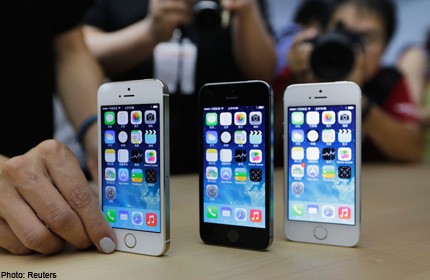No game changers from Apple


Apple finally unveiled its new flagship iPhone 5s last week, which adds a fingerprint sensor, an improved camera and a new, speedier A7 processor.
Oh, and it now comes in gold too.
Except for the mildly interesting fingerprint sensor, the rest are incremental upgrades.
But Apple also spent an inordinate amount of time talking up its new A7 processor, which is the first ARM-based mobile chip to use a 64-bit computing architecture.
Apple's marketing chief Phil Schiller even called it a desktop-class architecture.
Coming from Apple, all these technical details seem strange because the company usually glosses over them.
Besides the obvious benefit of supporting more system memory - a 32-bit system would be limited to 4GB of RAM - a 64-bit architecture can be more efficient as it is able to handle more complex instructions and mathematical calculations that require greater precision or involve huge numbers. This is useful for certain apps, such as those that involve encryption.
For the majority of apps, 32-bit is fine and a 64-bit system will run 32-bit apps without any issues.
No doubt the A7 chip has better performance than its predecessor, but it is more likely because of its processing hardware (more than a billion transistors) rather than its 64-bit architecture.
If it is anything like what can be seen on the PC platform, some developers will not even bother to switch to 64-bit because there are no benefits. Besides, the lower-cost iPhone 5c still uses the older, 32-bit A6 chip.
Apple was just the first mobile player to go 64-bit, as a few days later, Samsung said it would jump on the 64-bit wagon as well.
The rest of the industry is set to follow and the reason is simple: 64-bit support will be part of the next version of the ARM architecture used in the mobile chips powering most smartphones.
ARM is doing so because it has ambitions of moving into the laptop and desktop segments, which are on 64-bit.
The same probably holds true for Apple, which may see a future where its own processors are used in MacBooks.
The move to 64-bit feels like a retread of the path taken by the PC industry not too long ago.
But more processor cores, faster clock speeds, more RAM and better graphics are not game changers and neither is moving to 64-bit computing.
The truth is, the hardware on the latest mobile devices has outpaced the majority of the software produced by developers.
These are nice upgrades, but they do not really change the user experience.
To make another PC analogy, where is the smartphone equivalent of Intel's latest Haswell processor?
A chip that can dramatically improve battery life, like what Haswell can do, will benefit consumers more than all the other upgrades touted by smartphone vendors.
While going for 64-bit, Apple has also missed an opportunity to make a difference, by failing to include Near Field Communication (NFC) support on the iPhone 5s.
Apple could even have integrated its fingerprint sensor with such an NFC chip, as a form of authentication for mobile payments.
Lacking it is definitely disappointing for a phone touted by Apple as "forward-thinking".
vinchang@sph.com.sg

Get a copy of Digital Life, The Straits Times or go to straitstimes.com for more stories.